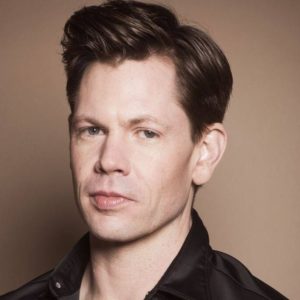A New York Times bestseller since his first publication at the age of twenty-two, Christopher Rice is the author of Bone Music (an Amazon Charts bestseller and the first novel in the Burning Girl series) and its sequel, Blood Echo, as well as the Bram Stoker finalists The Heavens Rise and The Vines. Blood Victory, his third Burning Girl novel released in August 2020. He is an executive producer on the television adaptations of The Vampire Chronicles and The Lives of the Mayfair Witches by Anne Rice for AMC Studios, and he also collaborated with her on Ramses The Damned: The Passion Of Cleopatra, a sequel to her phenomenally popular novel The Mummy Or Ramses The Damned. Together with his best friend and producing partner, New York Times bestselling novelist, Eric Shaw Quinn, he runs the podcast and video network, TDPS, which you can find at www.TheDinnerPartyShow.com. Learn more about Christopher at www.christopherricebooks.com.
What inspired you to start writing?
Reading. And the fact that I grew up in an environment where reading was treasured, along with writing. My early ambitions were to be a screenwriter, but then a moment came when I realized writing a novel was like being the director, the stars, the writer and the cinematographer all in one. And as my podcast co-host, producing partner and best friend Eric Shaw Quinn always says, the most intimate connection you can have with an artist is by way of their novel. You’re being invited into their heads.
What was it about the horror genre that drew you to it?
The sense of catharsis, the sense of an orderly world being upended. I think that’s always appealing to anyone who feels like an outsider. To suddenly find yourself in a world where nothing can be taken for granted, where everything is in peril, there’s something exhilarating about that for an artist. Even as your characters are menaced by terrors, there’s a sense that they might be able to make their own rules, their own new world, all in an effort to survive.
Do you make a conscious effort to include LGBTQ material in your writing and if so, what do you want to portray?
I do. I always have, with a few exceptions. If you’re writing about something as intimate, visceral and personal as fear, there’s no way you can excise your authentic self from your point of view. You might try, but it will still be there. So many things I’ve written have included menacing shadows of the boys who bullied me in my younger years for being gay. It’s hard to keep them out of my work.
What has writing horror taught you about the world and yourself?
Our fears reveal deep, fundamental aspects of our character. As Frank Herbert wrote, “What do you despise? By this you are truly known.” The same can be said for what terrifies us. There’s something therapeutic about taking an aspect of myself I’ve struggled with and using a villainous character to explore its dreadful extremes. Cynicism is always a danger for those of us who create dark works, but in the end we go deep into the darkness to find a path back into the light. What frightens us most as individuals can change and evolve over time, and it’s interesting to look back on my earlier works and see I’m not afflicted by the same nightmares.
How have you seen the horror genre change over the years? And how do you think it will continue to evolve?
Like all genres with a history of being dismissed by mainstream review publications, horror benefited greatly from the ability of reviewers, readers and authors to congregate in their own spaces online. I think that’s had the greatest impact. But I continue to be both befuddled and excited by the horrror/thriller overlap when it comes to marketing certain books. Some books go out of their way to avoid being defined as horror when they clearly are, and I think this tendency tugs the horror label in an unnecessarily negative direction.
How do you feel the LGBTQ community has been represented thus far in the genre and what hopes do you have for representation in the genre going forward?
There’s a difference between representation and centering. Books, movies, and television shows can include various forms of minority representation, but they’re not always compelling and they can often feel highly tokenized. Centering is the ideal. Stories in which the main characters are members of a minority, in which their point of view and concerns and fears dominate the narrative – this is what I call centering. Get Out and Black Panther are both excellent examples. But in the end, I’m in favor of what I call the buffet. Members of any minority should be able to find good stories about themselves than run the gamut from terrifying to swooningly romantic to philosophical to urgently political.
What is one piece of advice you would give horror authors today?
It’s the same piece of advice I’d give to any writer, passed down to me from my mother. “Write the book you want to read.”
And to the LGBTQ writers out there who are just getting started, what advice would you give them?
Don’t be deterred by conventional wisdom about what does or doesn’t sell, what will or won’t get bought by publishers. The strides being made in the areas of diversity and inclusion today would have seemed impossible a few years ago. The business of writing is defined by rejection and revision, and you want to be sure you’re going to bat and expending the energy on something you’re truly passionate about.



